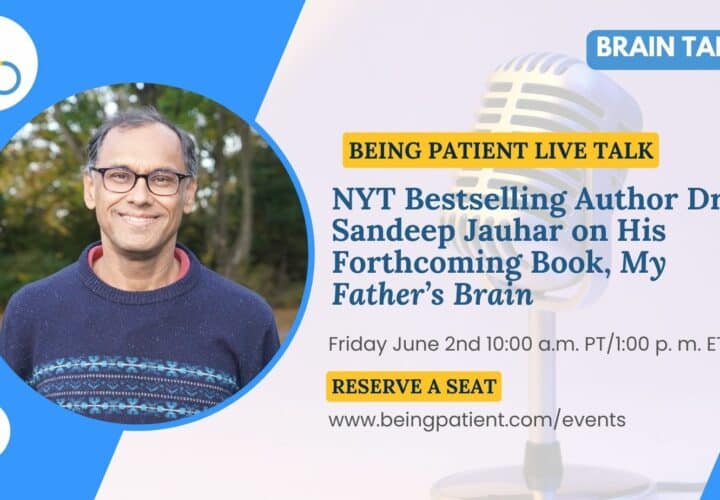Neuroscientist Dr. Elizabeth Goldfarb dishes about cortisol, a hormone associated with stress, and how it influences memory.
Stress is an unavoidable part of life, and with it comes cortisol — a hormone often vilified as a driver of anxiety, sleep disruption, and other health problems. But cortisol is more than just a “stress hormone.” In the right amounts and at the right times, it can actually help the brain encode certain memories more vividly.
This dual nature of cortisol — harmful in excess, helpful in balance — is at the heart of recent research by Dr. Elizabeth Goldfarb, assistant professor of Psychiatry and Psychology at Yale University. As director of the Cognitive Neuroscience of Affect, Memories, and Stress Lab, Goldfarb studies how stress changes the way we remember our lives, and what those memories mean for our behavior.
Goldfarb recently sat down with Being Patient founder Deborah Kan to unpack the complicated issue of stress and the brain, and answered questions about how much how cortisol can influence memory. Read on for an edited transcript of the talk, or watch the full session below.
Being Patient: When it comes to cortisol, what’s good and what’s not?
Dr. Elizabeth Goldfarb: It depends on what you’re trying to do. There’s a great review paper that calls stress a “neurosymphony.” A lot of stuff happens when your body is under threat or stress. Cortisol is one of them. But that’s not the only thing that’s happening, and it’s not the only thing that determines whether this response is going to be adaptive or ultimately not help you function. So let’s say you’re taking an exam. If the level of stress that’s going to make it hard for you to remember stuff is lower than [it is] if you’re trying to learn something exciting, then maybe that same amount of stress is going to be beneficial. Timing becomes really important [too], because it can take 10 minutes at least for cortisol levels to go up. There’s also the really quick fight-or-flight part of the stress response, which is going to have different effects on how you’re trying to behave.
Being Patient: What part of the brain releases cortisol?
Goldfarb: Cortisol is actually released peripherally, from your adrenals. Your hypothalamus tells the pituitary, which tells the adrenals, to release cortisol. That doesn’t only happen when you’re stressed, it also happens like if you have a glass of wine or smoke a cigarette. What’s interesting about cortisol is that even though it’s released [in the adrenals], it can cross what’s called the blood-brain barrier and actually go up into your brain. It’s going to take some time to do that. Once it’s there, there are special receptors for cortisol in the brain, and a lot of those receptors are concentrated in regions like the hippocampus, which is really important for memory, and the amygdala.
“If the level of stress that’s going to make it hard for you to remember stuff is lower than [it is] if you’re trying to learn something exciting, then maybe that same amount of stress is going to be beneficial.”
Being Patient: Can these receptors get maxed out? Like, is cortisol bad for us?
Goldfarb: We definitely need cortisol, and [our cortisol levels] change throughout the day. Cortisol levels are higher when you’re waking up in the morning. They help you wake up, and then they go down over the course of the day as you’re getting ready for bed. We actually have two kinds of [cortisol] receptors. One [kind] is called high affinity, meaning it will just get totally occupied by that cortisol you have when you first wake up in the morning. The second [kind] is [called] lower affinity, and [cortisol] only binds there once the first [receptors] are used up. [These receptors] are distributed in different parts of the brain, which suggests some parts might be more sensitive to cortisol than others.
Being Patient: Some of us feed off stress. How do you know how much stress is too much?
Goldfarb: It’s hard to research. Mostly we rely on cross-sectional studies where you look at individual differences across people, and then you can relate [their responses] to behavior across your sample. One thing you often hear about in stress research is the “Inverted U.” If there’s not enough stress, a person is not going to perform as well. [With everyone] there’s going to be that sweet spot [of stress] where learning and performance are enhanced. Then, obviously, once stress gets too high, you see an inability to focus, and a total breakdown of function.
“Cortisol levels are higher when you’re waking up in the morning. They help you wake up, and then they go down over the course of the day.”
Being Patient: Let’s relate it to memory. What does a stressed-out brain look like?
Goldfarb: It depends on where you are in the brain. The prefrontal cortex, which is involved in top-down regulation and higher order cognitive functioning, tends to not do very well under stress, so you see less activity there. Other regions, like the amygdala, can be more active under stress, and that’s partly because sort of the brakes have come off, so top-down regulation isn’t as active anymore. [I am most interested in] what’s happening in the hippocampus, because that’s where specific types of memories are encoded. All of these are different memory systems are supported by different brain networks. When we look in the hippocampus, when someone is forming more emotionally intense memories, cortisol can help the [brain] form those memories so it makes a stronger correlation between that emotional feeling and those experiences.
Being Patient: So cortisol is actually a big part of memory, then?
Goldfarb: Cortisol is not a requirement. There [have been studies] where, if you don’t have adrenal glands and you’re not producing cortisol, you can still learn [and remember] stuff. I think of [cortisol] as a tuning knob that turns up certain types of memories and might turn down other ones.
“I like to think of [cortisol] as a tuning knob that turns up certain types of memories and might turn down other ones.”
Being Patient: Talk to me a little about chronic stress. What are the implications of that on the brain and on memory?
Goldfarb: We do know quite a bit about what [chronic stress does] to the brain. In the prefrontal cortex, you start to see shrinking of the neurons, or dendritic atrophy. These little tendrils come off your neurons and fall off. They’re not functioning anymore. Places like the amygdala show the opposite pattern: increased branching, which could go along with hypervigilance, or more sensitivity to arousing things in your environment. In the hippocampus, it’s a little more complicated, because it has [different] parts. Some of them get bigger, some of them get smaller. [This] is one of the things my lab studies: what’s happening in the brain [during chronic stress, and] what could that mean for memory? Then we try to design memory games people do in the lab to test out those ideas.
Being Patient: Do we know the longer-term impact of chronic stress? Or does more research need to be done?
Goldfarb: Those structural changes can last a really long time, although there was one cool paper that had students taking a really stressful med school exam, cramming for it for months, and you saw those kind of structural changes that I was just talking about, but then they went on vacation after, and you saw some recovery of function. The brain is incredibly plastic. We’re able to be resilient to these stressful experiences.
“The brain is incredibly plastic.”
Being Patient: Do we know what recovery time is like?
Goldfarb: Not in terms that would be helpful for writing a prescription for, [say,] what you need to do to overcome a stressful event in your marriage. One of the things I’m interested in is when can stress be helpful? Because this is fundamentally an adaptive response. It helps us get out of danger. It helps us avoid future challenging situations. I don’t [know] how long it takes for your brain to go back to the way it used to be, but I think it’s hopeful that it is possible to change.
Being Patient: You’ve done research on alcohol and the brain. What’s the relationship between alcohol and cortisol?
Goldfarb: I kind of hinted at this earlier, but cortisol is not just a stress hormone. It’s also a response that can happen when you have a glass of wine, for example. I trained as a cognitive neuroscientist who studied memory and stress and learned all these things about the ways that stress could make us remember certain experiences better. When I moved into the addiction field, [I realized that] when you have a glass of wine, it’s like your body is having a stress response. [I started wondering] how that is transforming the way you remember a night out at a bar? Those memories are important for later choices to drink again, so somebody can’t relapse in a place where they used to use if they don’t remember that they used there before. Addiction is thought of as a disorder of learning and memory on a molecular level. One idea we had was, well, maybe it’s a stress response to alcohol that’s making you remember this experience in a different way, so that you’re going to drink again later. What we found was that if you give people cortisol in a pill form, it does make their memories [stronger].
Being Patient: Do we know why we release more cortisol when we drink?
Goldfarb: It’s a disruption to homeostasis, your body’s happy place, where you are when things are normal. We’ve seen this across species. [It actually happens] less in people who drink a lot, because their body starts to adapt, so they have a blunted response.
“Cortisol is not just a stress hormone; it’s also a response that can happen when you have a glass of wine.”
Being Patient: What is the role of cortisol in chronic drinking?
Goldfarb: I wouldn’t put it all on cortisol for sure, because alcohol can act [through] many different channels, but it’s certainly the case that regions [of the brain] like the hippocampus, which are so important for memory, are very sensitive to high levels of alcohol, which is really complicated to study experimentally.
Being Patient: Back to stress and the brain. How can I tell if stress is too much for my brain?
Goldfarb: Well, I think the way that you appraise it, or the way that you interpret it to yourself, can have huge effects on even how your body responds to stress. Some people, like Wendy Mendes, who’s at Yale, distinguish between a challenge state and a threat state. A challenge is like, “There are all these demands on me, but I can rise to the occasion. I can handle this. I thrive under these conditions.” A threat would be like, “I can’t handle it. I’m shutting down. I can’t function anymore. I need to stop doing whatever this is.” Just doing a gut check is a [good] way to say this is an adaptive state.
Being Patient: What’s your next area of research?
Goldfarb: A lot of what we’ve done up until now is classic memory experiments where we show people individual pictures and then the next day ask if [they] remember them. [We want to address] how real memory works. We’re starting new studies with smartphones to capture people’s experiences as they’re actually happening to see how [they] remember [their] own really stressful experiences? We call these episodic memories. [We’re tracking] the who, what, where, and when of a single experience and how you remember [that] experience. What we’ve seen in our first studies is that when you feel good, your memories are more tightly knitted together. When you remember who you were with, you also remember where, and all these [other] things in a tight package of a memory. Everyone experiences stress. [The hope is that] maybe we can harness [this data] to understand when is it good for you and when it is less beneficial.





I’ve been doing the PD-5 treatment from uineheath centre . co m for about 5 months. it doesn’t seem like I’m getting any better, but overall I actually have. My husband says it’s has done me a lot of good in terms of balance and ability to walk and get up from chairs. I can now write without my hands shaking. I feel better now than I have felt in years, and I can feel my strength again.
Hi Melissa, thank you for sharing your experience. It’s encouraging to hear you’re feeling stronger and noticing real improvements. We’re glad to have you as part of the Being Patient community and appreciate you contributing to the conversation.